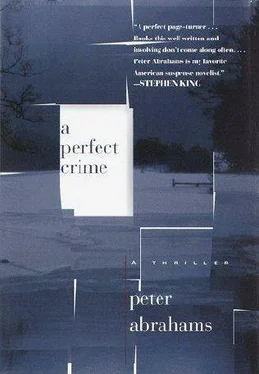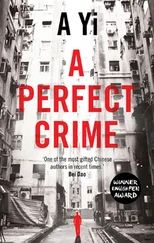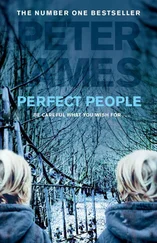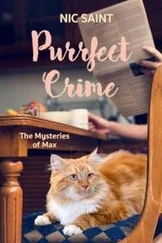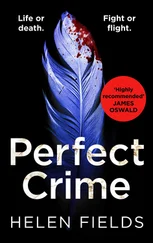Peter Abrahams - A Perfect Crime
Здесь есть возможность читать онлайн «Peter Abrahams - A Perfect Crime» весь текст электронной книги совершенно бесплатно (целиком полную версию без сокращений). В некоторых случаях можно слушать аудио, скачать через торрент в формате fb2 и присутствует краткое содержание. Жанр: Триллер, на английском языке. Описание произведения, (предисловие) а так же отзывы посетителей доступны на портале библиотеки ЛибКат.
- Название:A Perfect Crime
- Автор:
- Жанр:
- Год:неизвестен
- ISBN:нет данных
- Рейтинг книги:4 / 5. Голосов: 1
-
Избранное:Добавить в избранное
- Отзывы:
-
Ваша оценка:
- 80
- 1
- 2
- 3
- 4
- 5
A Perfect Crime: краткое содержание, описание и аннотация
Предлагаем к чтению аннотацию, описание, краткое содержание или предисловие (зависит от того, что написал сам автор книги «A Perfect Crime»). Если вы не нашли необходимую информацию о книге — напишите в комментариях, мы постараемся отыскать её.
A Perfect Crime — читать онлайн бесплатно полную книгу (весь текст) целиком
Ниже представлен текст книги, разбитый по страницам. Система сохранения места последней прочитанной страницы, позволяет с удобством читать онлайн бесплатно книгу «A Perfect Crime», без необходимости каждый раз заново искать на чём Вы остановились. Поставьте закладку, и сможете в любой момент перейти на страницу, на которой закончили чтение.
Интервал:
Закладка:
Standing at the foot of the bed, she studied the painting, saw what she had seen before-the resemblance, unaccountable in strictly photographic terms, the powerful, dominating pose, the surprising absence of sensuality-but nothing more, nothing that would explain any reluctance to have it examined. Then it struck her that something might be written on the back, some title or dedication. She laid the glass angel on the covers, walked around the bed, leaned over, got her hands on the frame-and heard a moan.
Ned’s moan. Francie whirled around, eyes on the closed bathroom door, heard him again. He was there, a few steps away, in quiet agony. Francie took those steps, not to say anything, not to put any pressure on him, just to hold him, to let him know she was there. She knocked quietly on the door.
Silence. Then he said, “Em? Is that you? I’ll be down in a minute.”
Francie heard agony in his tone, yes, but something else as well, something urgent and furtive that made her try the door. Locked. So she stooped, stooped to a lower level, to look through the keyhole in the old period door in Anne’s old period house. Ned was there, but not alone, and she’d misinterpreted the sound she’d heard. Francie’s eyes, expert eyes, trained for grasping detail and composition, took it all in, understood for her what her reeling mind could not: the half-clothed embrace, the glossy-haired woman, Chinese-American, leaning back on the sink, Ned curved over her, their faces turned toward the door in listening attitudes. Then Ned’s gaze fell toward the keyhole, fastened on it, and slowly went through changes that ended in horror.
“Francie?” Ned said. “Francie?” Through the keyhole, she saw him push himself away from the woman. “Oh my God, Francie, no.”
What happened next? Francie didn’t know, only knew she was somehow bolting down the stairs, free-falling, not even in contact with them, the glass angel in her hand. There was Em, still on the floor, going through the ornaments.
“Here you are, sweetheart,” Francie said, and gave her the angel. Then came a pause, in which neither of them seemed to breathe, and Francie took the liberty of touching Em’s head; her hand did so, really, and she didn’t stop it.
Then she was in the hall, getting her coat, walking out of the house, leaving. Walking fast, fast, fast. She could tell how cold it must have been from the hard bright snow on the ground and the icy sky and the whining wind, but she didn’t feel it at all. She was burning up. Walking, walking, walking: Francie walked and walked, but couldn’t escape the burning, and finally there was nowhere to go but home.
34
What a house Roger had! Whitey explored it from top to bottom. He’d been inside the cottages of the rich, the second homes, but never seen anything like this. The furniture, the rugs, the stuff! Even this sculpture or whatever it was on the bookcase in the living room, made of some material he’d never seen, maybe a rare stone or mineral, so smooth. What was it worth? Whitey picked up the sculpture-heavy, but not as heavy as it looked, maybe not so valuable after all-turned it in his hands: a strange, curved thing that reminded him of tits from one angle, ass from another. At that moment a phone rang, nearby and loud, startling him. He dropped the goddamn thing; it fell on the gleaming hardwood floor, just missing the edge of the thick carpet, and smashed in pieces. The noise was shattering; in the midst of it, he heard a voice, spun around, saw no one.
“Francie? Nora. I was going to swing by and ride out with you. Guess you’ve already left. See you there. God, I hate funerals, this one especially.” Beep.
Beep. Just an answering machine. Whitey told himself to stay cool. He said it out loud. “Stay cool.” Cool like ice, like snow. He glanced down at the remains of the sculpture. The cool thing, the smart thing, would be to leave no trace, right? In case some illegal act was going to happen, say. He went into the kitchen-what a kitchen! like there was a restaurant on the other side of the door-found broom and dustpan, swept up the mess, dumped it into a trash bin under the sink. Cool.
Beep. He jumped. The fucking thing had beeped again. Whitey returned to the living room, stared at the red light blinking on the phone. He wasn’t sure which button turned it off; maybe better, cooler, to forget about it, leave no trace. But what about the jumpiness? He went to the cabinet beside the tall plant in the corner, a waist-high cabinet with a silver tray on top bearing bottles-Scotch, vodka, gin, all fancy brands. He tried the vodka, not that he liked vodka particularly, but because they said it had no smell: leave no trace. He was getting very smart, and it went down nice like that, surprisingly nice, warm from the bottle. Beep. He took another, just a tich, as Ma used to say back in her drinking days, before this religious shit. Didn’t matter-he had no plans to see her again.
What were his plans, anyway? Exactly, like?
Mulling that question, Whitey opened the cabinet, just to have something to do while he thought. There were photograph albums inside. He leafed through one, saw Roger, a much younger Roger, in tennis whites, his arm around a beautiful woman, the woman he’d seen in his car, the super-Sue Savard. She wore a little tennis skirt. What a body! What was her name? He’d just heard it on the answering machine. Francie. He searched the albums for more pictures of Francie, preferably nude, but there was nothing like that. Roger and Francie smiling on a chairlift, Roger saying something to Francie on a sail-boat, Roger reading a menu at an outdoor cafe, Francie staring into the camera.
Beep.
Most of the pictures were dated underneath, none more recent than ten years ago. The last album, the most recent, petered out in the middle with two last pictures: Roger, Francie, and a big woman, standing on a tennis court, the two women laughing, Roger watching them; and Francie and another woman, both in bathing suits, sitting on a floating dock. They both had nice bodies, Francie’s better-bigger tits, for starters-but the bathing suits weren’t as revealing as some, and Whitey was about to close the book, when he realized there was something odd about that last picture. He studied it carefully, especially the wooden house behind the trees in the background, and then he recognized it-the cottage out on the island in the middle of the river. What did this mean? It had to mean something. Whitey didn’t know. He peeled the photograph off the page and stuck it in his pocket.
Beep.
Whitey helped himself to another tich of vodka, more than a tich. It had to mean something. He went into the kitchen and opened the fridge, looking for chocolate milk. There was none, but he found a jar of peanut butter, scooped some out with his fingers, ate it. He wandered to the desk in the little alcove, glanced at the mail on top, opened a drawer, saw a twenty-dollar bill, pocketed that, too. Under it lay a newsletter from some tennis club. CULLINGWOOD-FRANKLIN TO VIE FOR DOUBLES CROWN, he read, a headline followed by a brief article summarizing tennis matches, and two photographs, one of Francie, the other of… could it be? Yes. How could he forget that face, face of the woman who’d tried to kill him? Meaning? Meaning that there were-what was the word? Connections. Had to mean something. What? Whitey couldn’t take the next step, but the buzzing had already started, deep inside his head.
Beep.
Tich.
He didn’t feel his strongest, because of what she’d done to him, and that might be bad. He ate more peanut butter from the jar to give him strength. What next? What next? There was still the basement. He found the stairs and went down.
Nice and dark, the only light coming from narrow windows at the top of the wall, at street level. He could see well enough, was in a laundry room: washer, dryer, clothes hanging on a line. Bra and panties, for instance, which he felt as he went by. He opened a door, entered a large room, darker than the first; here the street-level windows were covered with black paper, and the only light came from a glowing computer screen. Computer, printer, desk, file cabinets: an office, Roger’s home office, where he worked late into the night, making all his money. Maybe he took little naps on that couch with the sleeping bag on top, or maybe that woman of his, Francie, sometimes came down for a quick one.
Читать дальшеИнтервал:
Закладка:
Похожие книги на «A Perfect Crime»
Представляем Вашему вниманию похожие книги на «A Perfect Crime» списком для выбора. Мы отобрали схожую по названию и смыслу литературу в надежде предоставить читателям больше вариантов отыскать новые, интересные, ещё непрочитанные произведения.
Обсуждение, отзывы о книге «A Perfect Crime» и просто собственные мнения читателей. Оставьте ваши комментарии, напишите, что Вы думаете о произведении, его смысле или главных героях. Укажите что конкретно понравилось, а что нет, и почему Вы так считаете.
